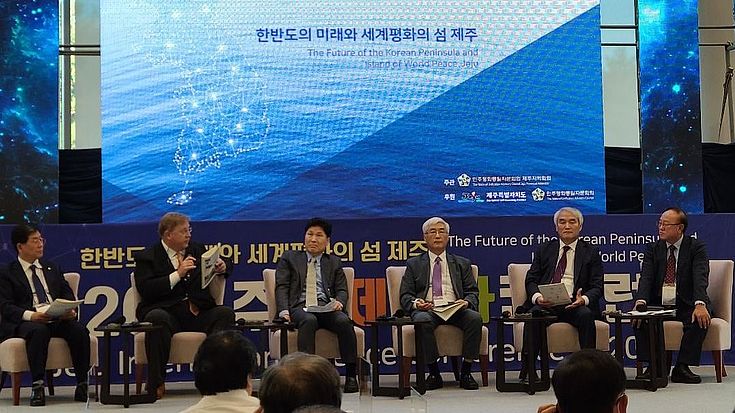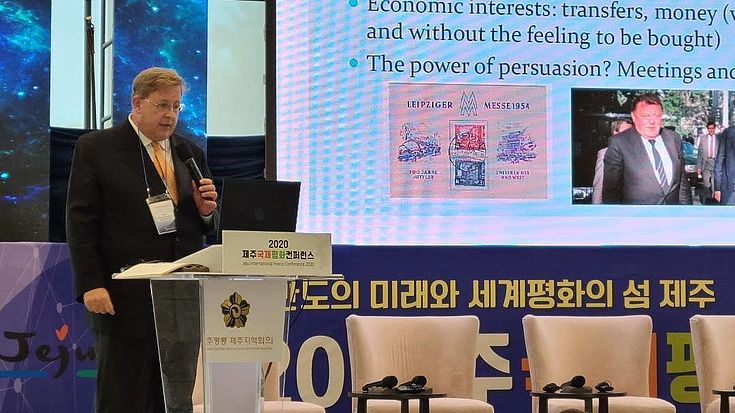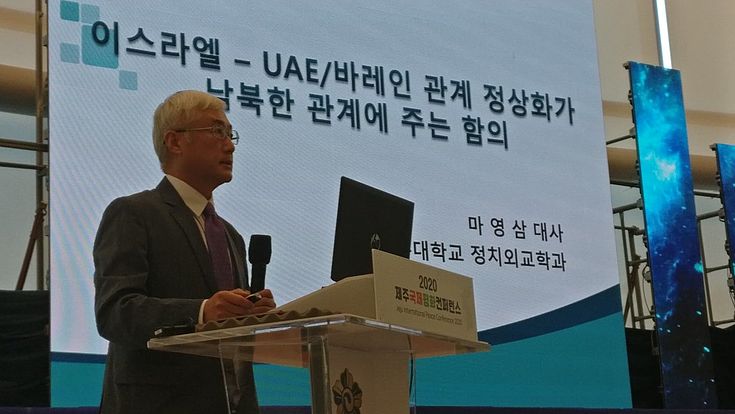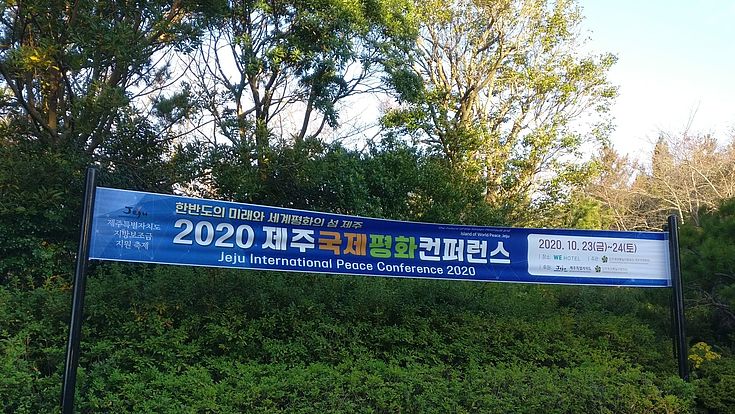Jeju International Peace Conference 2020
"The Future of the Korean Peninsula and Island of World Peace Jeju"

The National Unification Advisory Council (NUAC) is a Korean constitutional organ, with the President as a chairman, and an Executive Vice President in Seoul and Vice Presidents in each province of the country, including Jeju.
Jeju Island, though being the Southernmost part of the country and far from the inter-Korean border, has a history closely related to Korean division. In 1948, rebel forces fought related to the South Korean Workers Party, leading to a massive government campaign to pacify the island. Since 1998, when North Korea suffered from a collapsed economy and famine, Jeju island donated tangerines to the North, one of the signature goods of the island. The last shipment was in 2018, that time ordered by President Moon Jae-In, as a reciprocal gift for mushrooms Kim Jong-Un has sent.

The conference was opened by Kim Sung-Soo, Vice President of NUAC in Jeju, who pointed out that Jeju would be willing to be an island for meetings, not only of South and North Korea, but all of the Northeast Asian states. The keynote speech was by Jeong Se-Hyun, Executive Vice President of NUAC and former long-term Minister of Unification. A roundtable brought together Jeong with Kim Bong-Hyun of the Jeju Peace Institute, Heike Ahrenberg, Political Secretary at the German Embassy and Soma Hirohisa, Minister at the Japanese Embassy in Seoul. The panelists discussed the issues of peace and reconciliation in Northeast Asia based upon various perspectives. The session was moderated by former Assemblymen Kang Chang-Il. After the plenary, two expert sessions dealt with international comparisons and with the role of women in unification.

The first expert session included former Republic of Korea Ambassador to Israel, Ma Young-Sam, who discussed the recent rapprochement of Israel and Bahrain and the United Arab Emirates. Also, Dr. Bernhard Seliger of Hanns Seidel Foundation Korea looked upon 30 years of German unification. The session was moderated by Prof. Kang Keun-Hyong of Jeju University, and Prof. Son Gi-Woong of the Korea Peace and Cooperation Institute, Jeong Woo-Jin, Professor of Kyunghee University, Ko Kwan-Yong of Jeju Halla University discussed the presentations, together with a video comment by Lee Yong-Jeong of Joongang Ilbo's Unification Research Institute. In particular, Prof. Son Gi-Woong stressed that a unified Korea could only be a liberal democracy, not a form of mixture of the North and South Korean system.

In the second expert session, Prof. Emmanual Pastreich and Shin Mi-nyeo, representative of Saejowi, an NGO working on reconciliation in Korea, discussed the role of women for Korean unification. The session was moderated by Kim Yong-bo, head of the women chapter of NUAC in Jeju, and Byon Jeong-hon, Vice President of Jeju University, Kim Son-hee, head of a unification association of Jejudo, Cho Mi-Yong from NUAC Jeju, Choi Wol-Ah of the NUAC Northern Europe as well as Ha Beo-eh from NUAC in Beijing discussed the presentations.
Last but not least, a roundtable moderated by Ko Seong-Jun of the Jeju Unification Future Institute brought together another group of regional and national experts, namely Oh Hong-Sik, head of the Jeju Peace and Unification forum, Hong Jae-hyong, formerly from the Ministry of Unification and an old partner of Hanns Seidel Foundation in Korea, Kim Jin-Ho, Dean at Jeju University, Song Jae-Cheol from NUAC, Han In-Taek from the Jeju Peace Institute and Kang Bo-Mae of a Youth association.
The variety of opinions and perspectives was refreshing, but sometimes the variety of institutes involved was also bewildering. Hopefully, this proliferation of unification -related institutes will do something good for reconciliation and unification in the future.
